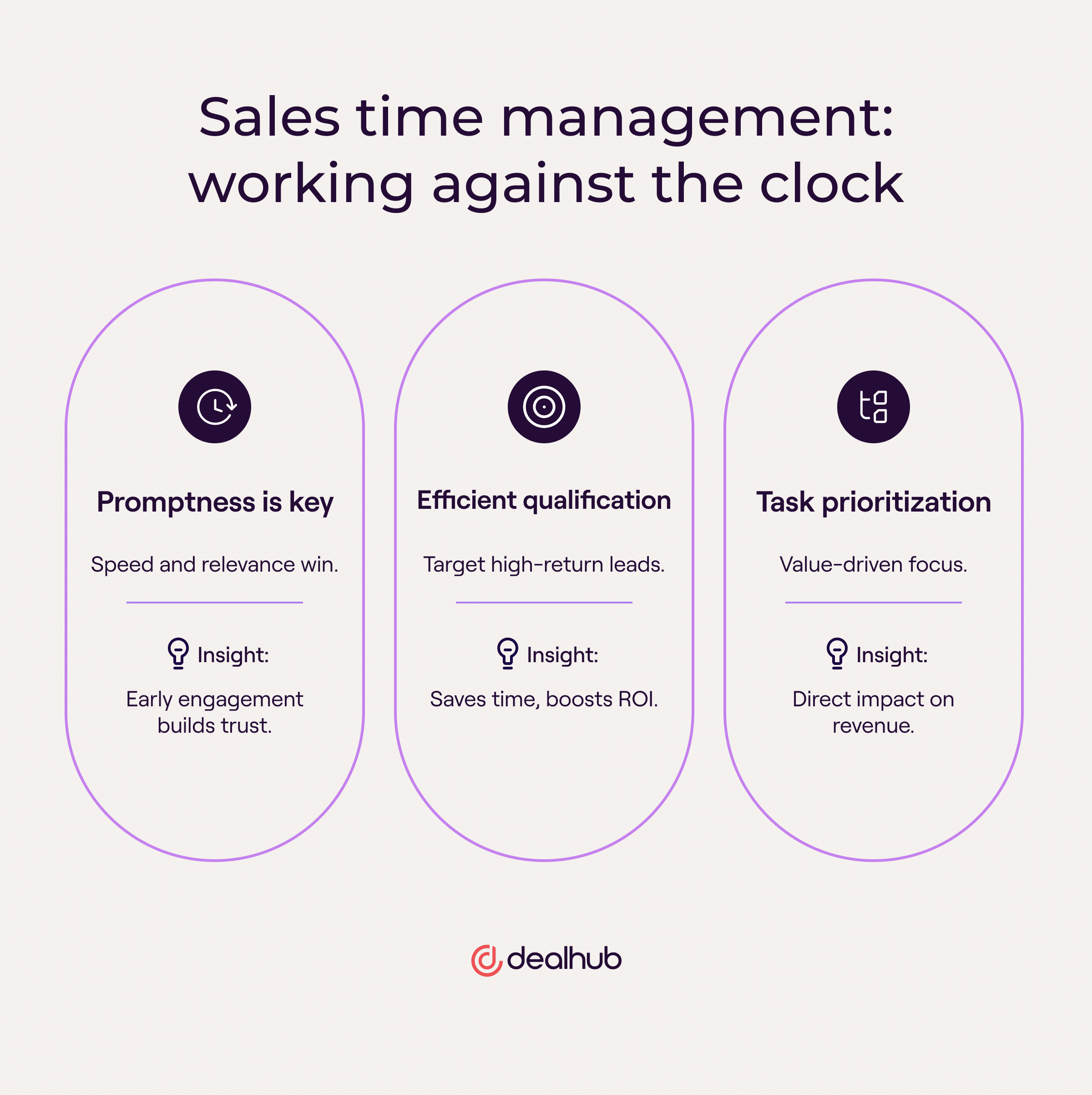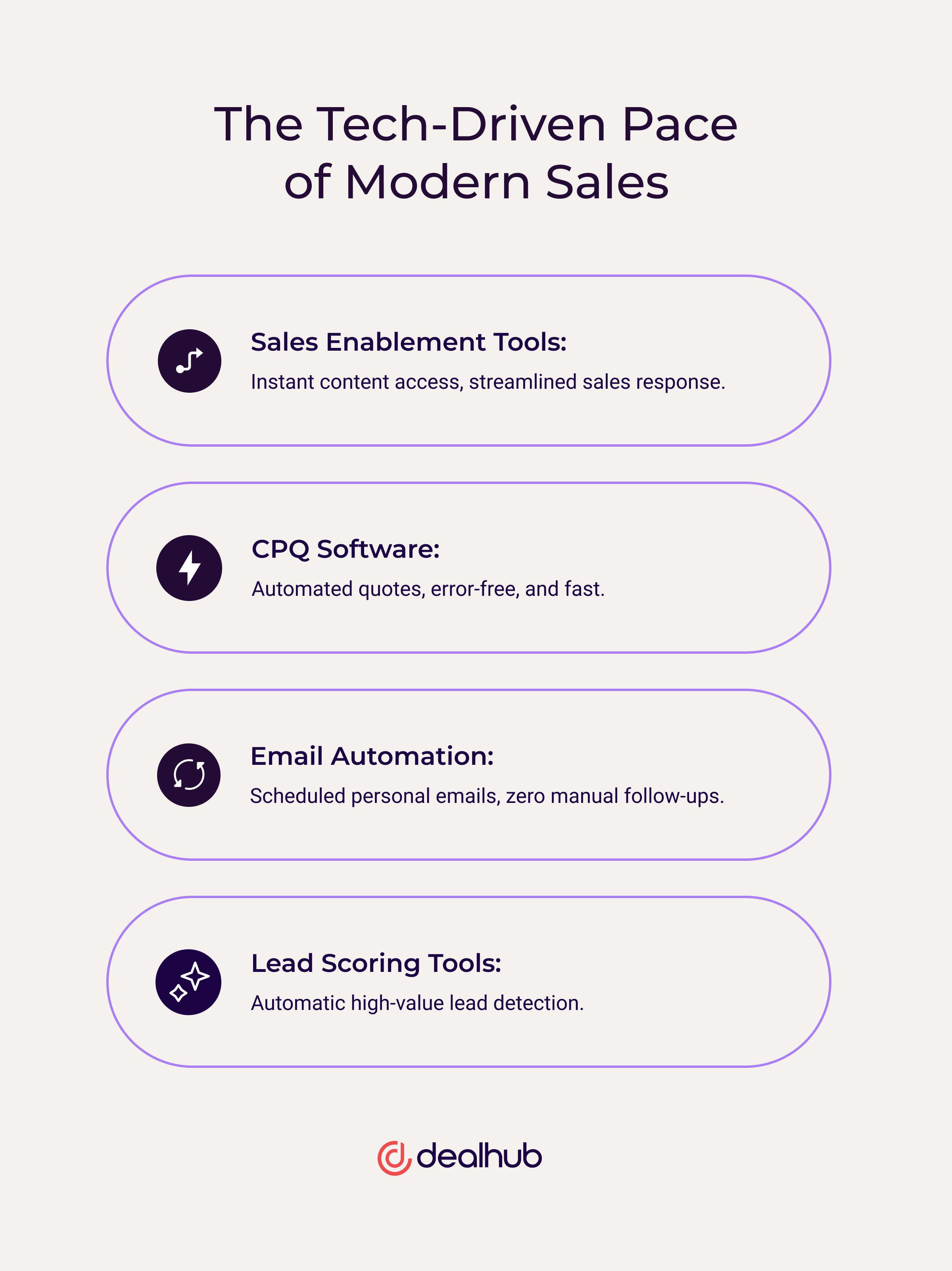At DealHub, we think that with good time management and efficiency, time can be your friend instead of an enemy. By unlocking time management and efficiency in selling, we seek to turn the tide in favor of every salesperson by striking the perfect balance between urgency and efficacy.
Below we offer insights and tangible strategies to optimize your daily routine, harness technology, and ensure every tick of the clock pushes you closer to your sales objectives. Understanding the value of time in sales sets the stage for effective time management. Let’s explore how to harness time to our advantage.
Sales time management: working against the clock
In sales productivity, time is a dimension that can propel you forward or hold you back. With every passing moment, opportunities and challenges evolve. Let’s explore the intricacies of time management in sales and how to make every second count.

Promptness is key
As you know, the early bird often gets the worm. A timely response can be the bridge between a potential lead and a loyal customer. It’s not just about being first; it’s about being efficient, relevant, and impactful. Customers are inundated with options, and your promptness can be the differentiator that positions you ahead of the competition.
Efficient qualification
The sales landscape is vast, and not every prospect is a golden opportunity. Time spent researching prospects may be time well spent. According to research by Crunchbase, top sellers spend 6 hours per week researching prospects. Efficient qualification can turn this time into gold by guiding you toward the most promising potential customers. By swiftly discerning which leads are primed for conversion, you channel your energy effectively, ensuring that your efforts yield the maximum return on investment.
Task prioritization
In the daily hustle of sales, getting lost in a sea of tasks is easy. However, not all tasks are created equal. While all tasks are essential, prioritizing those with a direct bearing on revenue generation ensures your sales team operates like a well-oiled machine. Whether nurturing a high-value lead or strategizing for a big pitch, ensuring that high-impact tasks take precedence is the key to optimizing your sales strategy.
Having established the importance of promptness and task prioritization, it’s essential to recognize the constraints of a salesperson’s day and how to navigate them.
Only so many hours in the sales day
The life of a salesperson is always on the go, with each hour packed with tasks and responsibilities. Navigating this daily maze requires strategic time management to ensure no moment goes to waste.
Time blocking
Time blocking is the practice of allocating specific chunks of time to dedicated activities throughout the day. For instance, a salesperson might time block 9-10 am solely for prospecting, ensuring no other tasks intrude on this vital activity. This method can be applied to various tasks, from client meetings to personal development, ensuring that each activity receives the undivided attention it deserves, leading to higher productivity and reduced stress.
Goal setting
Goal setting involves defining clear, measurable objectives for a specific timeframe. A salesperson, for example, might set a goal to reach out to 50 new leads by the end of the week. By breaking down larger objectives into smaller, daily tasks, goals provide a clear direction and purpose, acting as a motivating force that ensures steady progress and maintains momentum.
Single-tasking
Single-tasking is the practice of dedicating one’s full attention to a single task at a time instead of juggling multiple tasks simultaneously. Instead of drafting a proposal while intermittently checking emails, a salesperson would focus solely on the proposal until it’s complete. This approach ensures higher quality work, reduces the likelihood of mistakes, and often leads to faster task completion.
The two-minute rule
The two-minute rule is a time management principle suggesting that if a task can be completed in two minutes or less, it should be done immediately. For instance, if a salesperson receives an email that requires a quick response, they would reply on the spot instead of flagging it for later. This rule is particularly useful for administrative tasks that might seem insignificant but can pile up over time, ensuring a smoother workflow and a clearer mind.
While individual time management skills are crucial, leveraging the right tools can amplify efficiency. Let’s look at how technology is revolutionizing the sales process.
From time-consuming to time-efficient
Technology has become the linchpin of efficiency in the digital transformation era, especially in the sales domain. The transformation is evident: tasks that once consumed hours are executed in mere minutes, thanks to innovative sales tech.

Sales enablement tools
Sales enablement tools are more than just software; they’re the lifeblood of a streamlined sales process and the key to sales team success. From onboarding new team members with interactive training modules to managing a repository of sales collateral, these tools ensure that every piece of content is right at a salesperson’s fingertips. The result? Faster response times, consistent messaging, and a more informed sales team ready to tackle any challenge. For example, a sales rep can instantly access the most relevant content for their leads, eliminating the need to sift through vast amounts of data, thereby speeding up the sales process.
CPQ (Configure, Price, Quote) software
Gone are the days of manual quote calculations and prolonged back-and-forth emails with deal stakeholders. CPQ software automates the quoting process, ensuring that each proposal is accurate, tailored, and delivered with unparalleled speed. By eliminating human error and reducing the valuable time spent on quote generation, sales teams can focus on what they do best: building relationships and closing deals. For instance, in a traditional sales environment, generating a quote might involve manual calculations, cross-referencing with inventory data, and multiple revisions. With CPQ software, this process is automated, reducing the quote generation time from hours to minutes, ensuring accuracy and allowing salespeople to respond to prospects faster.
Email automation
Email remains a vital communication channel in sales, but manual follow-ups can be tedious and time-consuming. Email automation tools come to the rescue, allowing sales professionals to schedule personalized follow-ups, send targeted content, and nurture leads while focusing on other high-priority tasks. It’s like having a virtual assistant, ensuring no lead goes unnoticed. For example, instead of manually sending follow-up emails to each lead, a salesperson can set up an automated sequence that sends personalized emails based on the lead’s behavior, ensuring timely and relevant communication.
Lead scoring tools
As we talk about leads, you should know that not all are worth the same investment of time. Lead scoring tools act as a compass, pointing sales professionals toward the most promising prospects. For instance, instead of manually analyzing each lead’s interaction history, purchase intent, and engagement level, these tools automatically rank leads based on their likelihood to convert. This allows sales teams to focus on high-potential leads, increasing the chances of successful conversions.
By integrating these tools, sales professionals can shift their focus from time-consuming tasks to strategic activities that truly drive sales.
Having explored the tools that enhance sales efficiency, it’s evident that time and technology are intertwined in driving sales success. Let’s reflect on the overarching significance of time in sales.
Time is money
In the grand tapestry of sales, time is the golden thread that weaves together opportunities, strategies, and outcomes. Every second, when utilized effectively, compounds into minutes, hours, and days of productivity, pushing the boundaries of what’s achievable. As we’ve journeyed through the intricacies of time management and the transformative power of technology, one truth stands clear: time, when harnessed correctly, translates directly to revenue.
The strategies and tools highlighted in this article are not just methods but investments in efficiency, precision, and growth. By prioritizing sales activities, setting clear goals, focusing on one task at a time, and leveraging the power of modern sales technology, sales professionals can ensure that their time is always aligned with value generation.
Moreover, the digital tools at our disposal today are more than just conveniences; they are enablers. They enable sales teams to transcend traditional barriers, automate daily activities, accelerate the sales cycle, and focus on the human aspect of sales – building relationships, understanding customer needs, and delivering value.
As we at DealHub often emphasize, time is indeed money. But beyond its monetary value, time is also opportunity, growth, and potential. By mastering the art of time management and equipping ourselves with the right tools, we not only optimize our sales processes but also create a future where every tick of the clock echoes with success.









